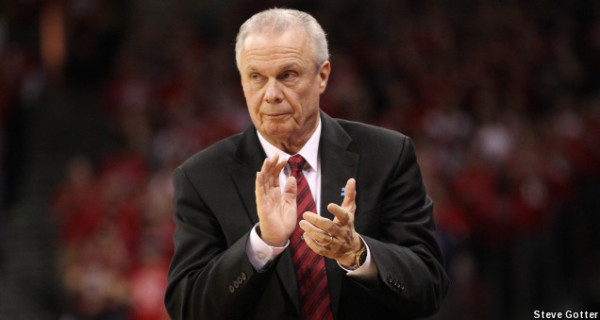On Bo Ryan’s Lasting Legacy at Wisconsin
Posted by Brendan Brody on December 17th, 2015Dick Bennett’s role in building the Wisconsin basketball program cannot be overlooked. This is a program that was a Big Ten doormat for nearly a half-century before he brought the Badgers back to prominence with several NCAA Tournament appearances culminating in a run to the 2000 Final Four. If Bennett gets credit for laying the program’s foundation, though, then Bo Ryan came to Madison and made it a seven-figure property in a wealthy neighborhood. During his 14 seasons at the helm, Wisconsin became an NCAA Tournament fixture. His teams rarely had a surplus of NBA-caliber players, yet they still went on an unfathomable conference run where the Badgers never finished lower than fourth place in the Big Ten regular season. Much has already been discussed about his decision to step down as head coach 12 games into the season, but this is not the space for that debate. Instead, this post is meant to look at his career as program-builder during his time in Madison.

Bo Ryan finished his career as one of the best head coaches in the history of the Big Ten. Photo: Steve Gotter
If we look at records through the decades, Wisconsin notched a 111-127 overall mark in the 1960s, a 108-145 mark in the 1970s, and a 118-166 record in the 1980s. With the arrival of Bennett in the 1990s, that mark improved to 157-142. Since Ryan took over the helm of the program in 2001, however, the Badgers’ overall record has been 364-130. He also made the NCAA Tournament every year he was on the sideline in Madison, and this marked improvement wasn’t necessarily because he was the slickest salesman on the recruiting trail. Wisconsin brought in the occasional elite prep star like Brian Butch or Sam Dekker, but for every blue-chipper he lured to his program, there were two or three versions of Mike Bruesewitz or Josh Gasser also on board — players of somewhat lesser talent who were nevertheless perfect fits for his system.
All that winning and consistency for his first 12 seasons were great, but everything came to a crescendo during the last two campaigns. Led by National Player of the Year Frank Kaminsky and a veteran cast surrounding him, Wisconsin went to consecutive Final Fours, put together a come-from-behind Final Four win over perhaps the most dominant regular season team in two decades, and swept both Big Ten championships last season. Despite the Badgers’ somewhat rocky start this year and his surprising departure, it’s difficult to argue that Ryan didn’t go out on top. The program is in great position for sustainable success, and Ryan should get the majority of the credit for developing the Badgers’ culture that facilitates it.
One of the persistent criticisms of the Badgers throughout Ryan’s tenure is that they won ugly, slowing the game down to a crawl and using physical defense and fundamentals to eke out wins in the 50s. There was probably some truth to that criticism earlier in Ryan’s career, but his last two teams, with their perfect medley of gifted offensive players combined with a proven defensive system, led to beautiful basketball. The numbers bear this out, as the team was the most efficient offensive group in the country. Over his tenure, Ryan led his teams to a top 51 offense in all but one season (2012-13); defensively, they hit that mark in 10 of his 15 seasons (including the top overall defensive unit in 2012-13. Numbers are just numbers to the casual college basketball fan, but the perception for a good number of years during Ryan’s career was that the Badgers were slow and boring. They had an old-school coach who stressed tempo and defense and said zany things in press conferences, but there wasn’t really any reason to advance them too far in your bracket because teams with more talent would inevitably triumph.
On a personal note, I fell into all of those mental traps before I started covering the Big Ten for this website two seasons ago. I had followed the ACC mostly due to my Virginia roots and residence, but had casually watched the Big Ten because it was a consistently excellent league with a handful of Top 25 teams in any given season. But Wisconsin wasn’t the attraction; rather, teams like Michigan State, Michigan, Indiana and others held more interest. Or so I thought. The best compliment I could give Ryan as a head coach is that his style of play becomes much easier to appreciate when you approach it as a student of the game. He stressed the simple things like never turning the ball over, always taking the best possible shot, and avoiding silly fouls — all of which are easily glossed over when you see a team play a handful of times a year. When I started watching the Badgers on a regular basis, however, my appreciation of Ryan’s ability to teach basketball went through the ceiling.
With Greg Gard the interim coach and an incredibly lofty standard to live up to, Wisconsin basketball is on the shakiest ground it has been in a long while. But remember, a longstanding Big Ten also-ran managed to become one of the top dozen or so best programs in the country. Bo Ryan didn’t put this program completely on the map, but he took the blueprints and upgraded the hell out of it.














































